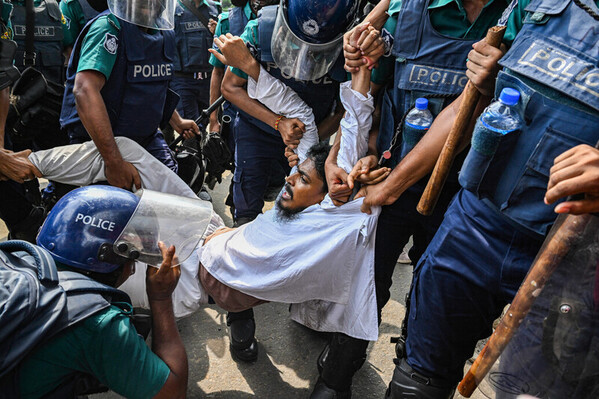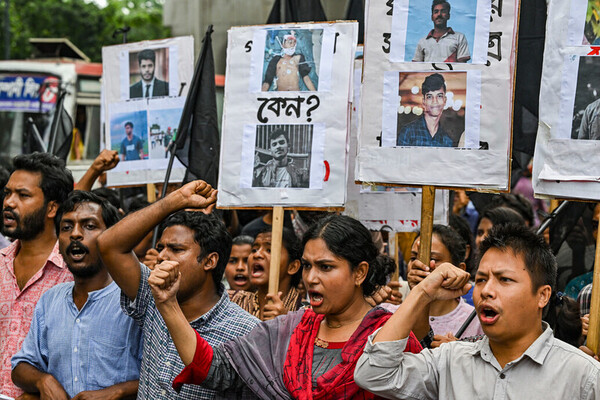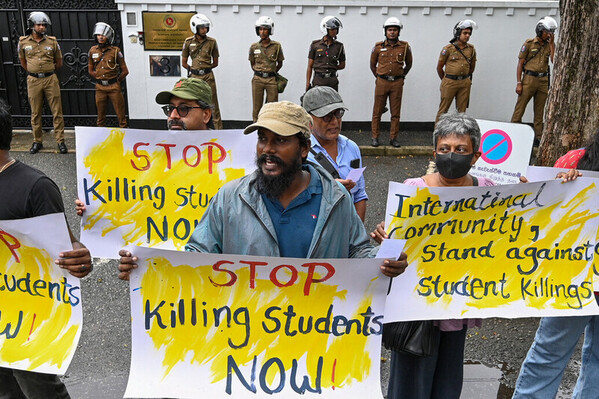Rony Sheikh is just one of more than 10,000 protesters who have been arrested since July 2024. These arrests are part of the government’s brutal crackdown against protesters, including students, opposition members, and bystanders. Rony’s family claims they have been denied access to him, as have his lawyers. They fear he may be subjected to torture and other inhumane treatment while in custody.
The government’s harsh response to the protests has already claimed over 400 lives, including journalists and innocent bystanders. The Bangladeshi authorities must immediately stop the mass arrests, release all those detained for peacefully exercising their human rights, and guarantee fair trials for all detainees. The world is watching, and it is time for Bangladesh to respect the rights of its citizens.
Here’s what you can do:
Write to the Attorney General urging him to:
- Immediately release Rony Sheikh and all other protesters who have been unlawfully detained solely for exercising their human rights
- Ensure that all protesters arrested for a recognizable offence receive a prompt and fair trial
- Immediately grant access to the families and the lawyers of those who have been detained, and ensure that the whereabouts of each person in detention is urgently communicated to their families
- End custodial torture and other forms of ill-treatment
- Conduct a prompt, thorough, effective, independent, and impartial investigation into the deaths and injuries during the crackdown. Those found responsible for the unlawful use of force must be held accountable.
Write to:
Md Asaduzzaman
Attorney General of Bangladesh
Office of the Attorney General
Bangladesh Supreme Court area
Shahabagh, Dhaka-1000, Bangladesh.
Email: attorneygeneraloffice.bd@gmail.com
Salutation: Dear Md Asaduzzaman,
And copy:
Mr. Hossne Ayub DEWAN
Deputy High Commissioner/Acting High Commissioner
High Commission for the People’s Republic of Bangladesh
350 Sparks Street, Suite 1100
Ottawa, ON K1R 7S8
Tel: (613) 236-0138 / 236-0139 Fax: (613) 567-3213
Email: mission.ottawa@mofa.gov.bd
Protests erupt over controversial job quota
Since July 1, 2024, Bangladesh has been gripped by widespread protests. The unrest began after the government reinstated a controversial 30 percent quota in government jobs for the descendants of independence war veterans. This quota, abolished in 2018 after similar protests, is seen by many, especially university students, as unfairly favoring supporters of the ruling party.
Initially, the protests were largely peaceful. However, tensions escalated on July 15 when demonstrators were attacked, reportedly by members of the Bangladesh Chhatra League (BCL), a group affiliated with the ruling party. The attacks, which took place at Dhaka University and other institutions, involved the use of rods, sticks, bricks, and firearms, resulting in numerous injuries and escalating violence across the country. In response, authorities arrested thousands of protesters.

Crackdown intensifies amid political turmoil
On August 5, former Prime Minister Sheikh Hasina resigned and fled the country after 15 years in power. Her departure followed a weekend during which some detained students were released on bail. However, many protesters remain imprisoned, including 18-year-old Rony Sheikh, who was arrested on July 22.
Rony, in the middle of his Higher Secondary Certificate exams, was arrested at his rented residence after authorities found protest videos on his mobile phone. His family has been unable to contact him, and he has not been granted access to a lawyer.
The situation took a deadly turn on July 19, when the most violent crackdown occurred, resulting in 75 deaths in a single day. In response, the government deployed military and paramilitary forces, including the Rapid Action Battalion (RAB) and Border Guards Bangladesh (BGB).
A “shoot-on-sight” curfew was imposed, along with a nationwide internet blackout. Amnesty International has verified multiple instances of unlawful force, including the shooting of 25-year-old student Abu Sayed by police officers from a distance of 15 meters, despite posing no threat.
Human rights violations and international concern
By July 31, 2024, over 200 people had been killed (government figures report 145), thousands injured, and more than 10,000 arrested. Many detainees are charged under unnamed mass First Incident Reports.
Security forces conducted mass arrests, often shutting down internet connections in targeted neighborhoods and raiding homes to arrest students. In some cases, students receiving treatment in hospitals were forcibly discharged and taken into custody, with the Minister of Law claiming they were detained for their own safety.
International law is clear on how law enforcement should respond to protests, even when some participants become violent. According to the UN Human Rights Committee’s General Comment No. 37 on the Right of Peaceful Assembly, participants in an assembly cannot be held responsible for isolated acts of violence by a few protesters.
Even when an individual engages in violent conduct, their other rights must still be protected. The unlawful use of violence by security forces must be investigated, and those responsible must be held accountable.
 © Zabed Hasnain Chowdhury/NurPhoto/Getty
© Zabed Hasnain Chowdhury/NurPhoto/GettyBroader repression and the need for international action
This crisis highlights a broader pattern of repression in Bangladesh. Laws like the Digital Security Act 2018 and the Cyber Security Act 2023 are frequently used to stifle dissent and suppress free speech. The international community’s intervention is crucial in pressuring the Bangladeshi government to uphold its human rights obligations and restore public trust in the rule of law.
Immediate action is needed to end the violence, release those unjustly detained, and hold those responsible for human rights violations accountable.
Please take action as soon as possible until November 7, 2024! The UA will be duly updated should there be the need for further action.




























